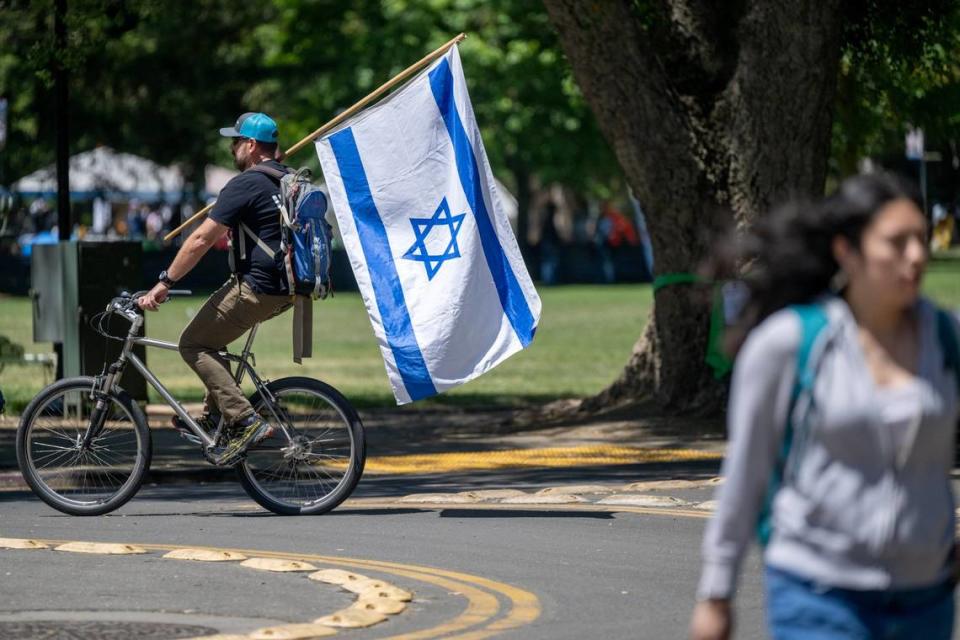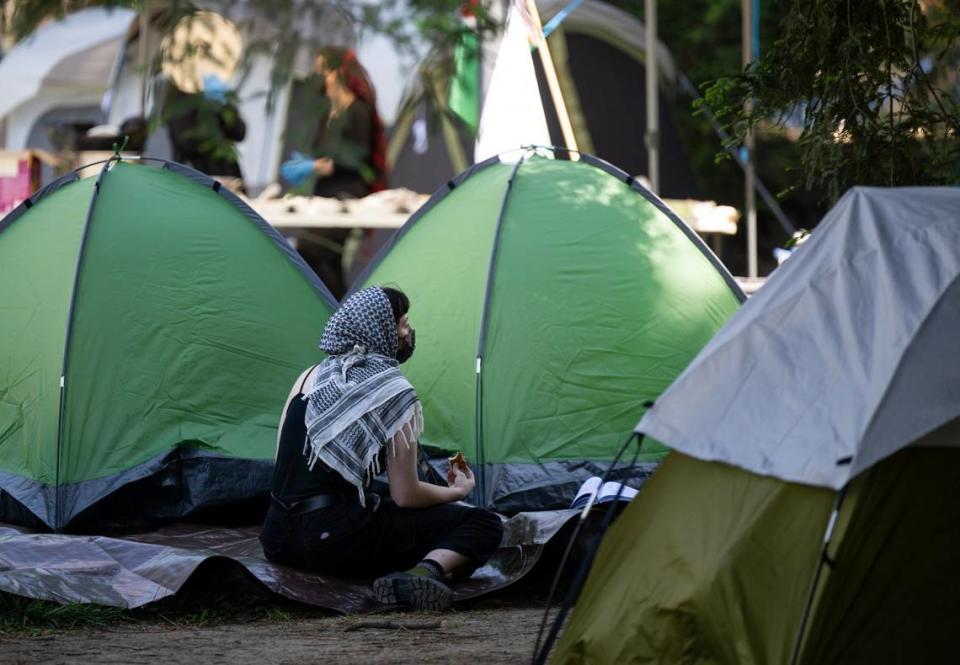Man files lawsuit against UC Davis for handling of encampment. Here’s what he’s alleging
A Davis resident is suing the University of California, Davis, and its top administrators for the school’s handling of the ongoing pro-Palestine encampment on campus.
Jonathan Groveman, a pro-Israel member of the Davis Oct. 7 Coalition and a counterprotester to the encampment since it began May 6, has filed a lawsuit alleging UC Davis is supporting the encampment that has violated his First and 14th Amendment rights, as well as his ability to use a path through a busy part of campus.
“Allowing extremists to seize control of the center of the UC Davis campus has turned a premier university into a place that excludes Jews and the disabled from a place they call home,” Groveman’s attorney, David Rosenberg-Wohl, said. “Rather than showing leadership to preserve a place of debate and learning, the administrators of UC Davis have shown appalling disdain for everyone but the loud and angry few and have abandoned their responsibility to the community at large.”
The suit names Chancellor Gary May and other school officials, as well as UC President Michael Drake, who oversees the 10-campus system.
“Defendants have selectively chosen not to enforce the official policies of UC Davis and the University of California generally ... all designed to make the UC Davis campus a place for the robust and respectful free expression of ideas instead of holding it hostage to, and effectively adopting, only one extremist view,” alleges the suit, which seeks the court to break up the camp and unspecified damages.
A UC Davis spokesperson said Monday that the university was “committed to a safe and peaceful campus environment that respects our community’s right to free expression while maintaining our educational and research mission without disruption.”
“When the university receives a complaint of denial of reasonable accommodation, antisemitism or other offensive behavior, it immediately reaches out to the affected parties to provide support and resources, and reviews the allegations under the university’s anti-discrimination policy,” the school said.

In the suit, Groveman says he is a veteran who regularly goes to campus and is required to avoid walking on soft surfaces because of ongoing knee and back injuries, in addition to Meniere’s disease, a condition that has given him spells of vertigo. The encampment, which Groveman says is preventing outsiders from using a cement path through the university’s Memorial Quad, is a violation of the Americans with Disabilities Act.
Groveman admitted to confronting the encampment multiple times, including at 5 a.m. May 10 with a megaphone in what he called “an early rise to start their day.”
“All of it has been a peaceful counterprotest to help stimulate the other side of the dialog that there’s more to the issue,” he said. “There’s two sides to the conflict and just reminding people that both sides are important and you can’t have one side without the other.”
Groveman hasn’t been the only counterprotester at the encampment. UC Davis Popular University for the Liberation of Palestine spokesperson Stanford McConnehey said during the first week of the encampment there were at least three run-ins with agitators, including a man walking into the encampment and punching a security guard, and others who have used racial epithets.
Groveman denied he or other members of the Oct. 7 Coalition used racially charged language when confronting the encampment.
Groveman, who said he is half Jewish, said he and other members of the coalition started counterprotesting after hearing of Jewish students getting followed home by people whom they said they did not recognize from campus. Groveman’s lawsuit states that he believes a “significant number” of the individuals at the encampment are not UC Davis students or faculty.

McConnehey said the protesters included students — undergrads and graduates — as well as community members, and that the protest was not centered around religion. McConnehey said during the first week of the encampment that Jewish community members made signs showing solidarity with Palestine. McConnehey also said the encampment has hosted Jum’ah prayer and a Shabbat service.
“This is not a religious war,” McConnehey said. “It’s not about religious identity. It’s about land and colonization.”
The ongoing war in Gaza has killed more than 35,000 Palestinians living in Gaza since Hamas attacked Israel on Oct. 7 killing more than 1,200 Israelis in the deadliest attack on Jews since the Holocaust.
Groveman also said he wanted to bring attention to the eight American hostages who remain held by Hamas. In all, 45 Americans were taken hostage Oct. 7 in the Hamas attack.
UC ‘committed to keeping the campus peaceful’
The encampment on UC Davis’ campus has grown to roughly 200 people over its two weeks while protesters said they are pushing for the school to end its ties with entities that are complicit in Israel’s war in Gaza. They have also called for May to resign from either his position at the school or from the board of Leidos, a military technology firm.
UC Davis last week, before Groveman’s lawsuit was filed, announced it spoke with members of PULP on the campus quad and discussed protesters’ demands.
“Campus leaders expressed appreciation for the students’ efforts to keep the encampment safe and peaceful and listened to the students’ concerns about the ongoing humanitarian crisis in Gaza,” the school’s statement said. “UC Davis leaders said the conversation was productive and that they will continue to engage with the students about issues they are raising.”
The statement also noted what May said about the encampment when it began, saying, “UC Davis cannot and will not discipline students for speech protected by the First Amendment, even though he recognizes that such speech sometimes distresses or inconveniences members of the campus community. We remain committed to keeping the campus peaceful and welcoming for people of all backgrounds.”
Possible strike by grad students on campus
In addition to the encampment and sporadic counterprotests, academic workers represented by the United Auto Workers at UC Davis could strike in the coming days over the UC system’s handling of the protest encampments.
UAW Local 4811 represents 48,000 graduate students who work as teaching assistants, tutors, researchers and other academic workers on the 10-campus UC system. Organizers said the campuses will not strike all at once, opting instead for rolling strikes among the campuses.
The UAW local’s movement started Monday at UC Santa Cruz, where graduate students walked off the job to protest UC’s crackdown on demonstrations. Union leaders said the strike over unfair labor practices would disrupt classes as the Central California campus gets ready for finals.
“The ball is in UC’s court — and the first step they need to take is dropping all criminal and disciplinary proceedings against our colleagues,” Rafael Jaime, president of UAW 4811, said in a statement.
The administration says the strike is unlawful and a violation of the union’s contract with UC, which prohibits work stoppages, Lori Kletzer, campus provost and executive vice chancellor, said in a statement.
A spokesperson for UC Davis’ represented workers said they were “standing in solidarity” with others around the UC system but it was not clear when the strike would be coming to Davis.
The Bay Area News Group contributed to this story.

